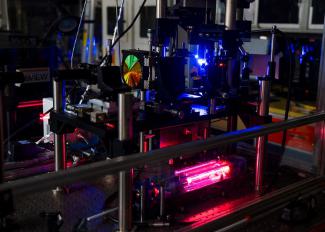NETL amplifies the impacts of its nationally recognized technical competencies through collaboration with a variety of organizations, including university partnerships crucial to early-stage development of energy technologies that will lead the nation to a net-zero carbon emissions economy by 2050.
One prime example of these valuable partnership efforts is the work of an ongoing collaborative research team comprising NETL and University of Pittsburgh (Pitt) researchers who have developed and commercialized sensor technologies, won multiple Carnegie Science Awards, produced more than a dozen patents and pending patents, advanced the understanding of energy production through high-impact research papers, and most recently, applied a first-of-its-kind distributive sensing method to solid oxide fuel cells (SOFCs) — a promising clean energy technology.
For the most recent accomplishment, which was aimed at improving the durability of SOFCs, Professor Kevin Chen, Ph.D., led the Pitt researchers, who leveraged the extensive research laboratories of the University’s Swanson School of Engineering, to fabricate and functionalize the distributed sensors that were then tested and characterized by NETL researchers in their own cutting-edge facilities.
“NETL has been collaborating with Dr. Chen’s group on a variety of sensor projects since approximately 2008,” said Michael Buric, Ph.D., who leads current NETL work on the team. “At that time, we were working to construct the world’s fastest Raman gas analyzer using novel hollow waveguide technology. After patenting and licensing the Gas Analyzer technology, we focused on optical fiber sensors that enable distributed sensing capabilities, which means they have the ability to sense parameters of interest all along the optical sensing fiber.”
The NETL-Pitt team continued developing the distributed sensing technology, applying their novel sensing methods to a range of measurement and monitoring applications across the energy infrastructure spectrum to enable new capabilities in operational efficiency, reliability and safety. The team found that optical fibers are capable of performing at high temperatures, in erosive or corrosive environments, and in highly oxidizing or reducing conditions. This led to the discovery of a fiber optic sensor capable of measuring the temperature and gas concentration distribution inside an operating planar SOFC.
“This was a truly collaborative effort, as we used a unique laser fabrication capability to create the high-temperature stable and hydrogen-resistant distributed fiber sensors at Pitt,” Chen said. “And this work wouldn’t have been possible without NETL’s extensive sensor development and testing facility, fuel cell testing facility and modeling capability.”
After the success of the SOFC distributed sensor work, the team is looking to the future to develop even more robust sensors capable of operating in even more extreme conditions, which will lead to greater power generation efficiencies. Furthermore, the team is working to apply this sensor technology to support efforts that address climate change. Chen explained that the team envisions using their unique sensor capability to harness valuable data with high temporal and spatial resolution to develop better engines, turbines, battery systems and solar thermal systems.
“We are extremely grateful for NETL’s incredibly open attitude toward university collaborations,” Chen said. “Our graduate students and faculty are able to tap into NETL’s wide range of research expertise, which has resulted in not only world-class university research, but also highly trained personnel. NETL’s materials, sensor and modeling expertise supports innovation across so many fields, and previous collaborative work with the Lab has helped to produce energy experts that are now advancing the fields of SOFCS, combustion, rare earth elements, renewable energy and many others. For us, since the Lab is just down the road in South Park Township, NETL is a true national treasure right in our neighborhood.”
The U.S. Department of Energy’s National Energy Technology Laboratory develops and commercializes advanced technologies that provide clean energy while safeguarding the environment. NETL’s work supports DOE’s mission to ensure America’s security and prosperity by addressing its energy and environmental challenges through transformative science and technology solutions.




